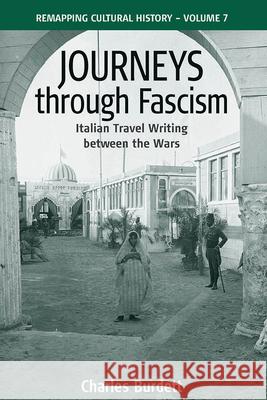Journeys Through Fascism: Italian Travel-Writing Between the Wars » książka
Journeys Through Fascism: Italian Travel-Writing Between the Wars
ISBN-13: 9781845457167 / Angielski / Miękka / 2010 / 284 str.
Journeys Through Fascism: Italian Travel-Writing Between the Wars
ISBN-13: 9781845457167 / Angielski / Miękka / 2010 / 284 str.
(netto: 130,11 VAT: 5%)
Najniższa cena z 30 dni: 135,22
ok. 22 dni roboczych.
Darmowa dostawa!
"As well as being physical journeys, they were explorations and reworkings, through travel, of the writers' own sense of Italian and Fascist identity. Indeed, one of the most interesting suggestions of this original and important book is that the identity of Fascist Italy was built out of comparisons with other places...a fascinating book on Italian travel writing of the Fascist period." - Times Literary Supplement ..".this is a highly recommended book for those wishing to expand their knowledge of the cultural and political roles of travel writing, as well as the perceptions, ambitions, inconsistencies, contradictions and areas of ambiguity prevailing among Italian elites under Fascism." - Journal of Contemporary European Studies " a]smoothly written, thoughtful study" - H-Net ..".a sophisticated and very well researched study that] makes a significant contribution to the growing corpus of studies of fascist culture and of the often subtle and varied ways in which the regime's goals and messages were transmitted to the general public. It is well organized and well written and is intelligently structured." - Christopher Duggan, University of Reading During the twenty years of Mussolini's rule a huge number of travel texts were written of journeys made during the interwar period to the sacred sites of Fascist Italy, Mussolini's newly conquered African empire, Spain during the Civil War, Nazi Germany, Communist Russia and the America of the New Deal. Examining these observations by writers and journalists, the author throws new light on the evolving ideology of Fascism, how it was experienced and propagated by prominent figures of the time; how the regime created a utopian vision of the Roman past and the imperial future; and how it interpreted the attractions and dangers of other totalitarian cultures. The book helps gain a better understanding of the evolving concepts of imperialism, which were at the heart of Italian Fascism, and thus shows that travel writing can offer an important contribution to historical analysis. Charles Burdett, Senior Lecturer in Italian Studies, specializes on Italian culture under Fascism. He is the author of Vincenzo Cardarelli and his Contemporaries (Oxford University Press, 1999). He is the editor with Claire Gorrara and Helmut Peitsch of European Memories of the Second World War (Berghahn Books, 1999) and with Derek Duncan, of Cultural Encounters: European Travel Writing of the 1930s (Berghahn Books, 2002).
"As well as being physical journeys, they were explorations and reworkings, through travel, of the writers own sense of Italian and Fascist identity. Indeed, one of the most interesting suggestions of this original and important book is that the identity of Fascist Italy was built out of comparisons with other places...a fascinating book on Italian travel writing of the Fascist period." · Times Literary Supplement"...this is a highly recommended book for those wishing to expand their knowledge of the cultural and political roles of travel writing, as well as the perceptions, ambitions, inconsistencies, contradictions and areas of ambiguity prevailing among Italian elites under Fascism." · Journal of Contemporary European Studies"[a]smoothly written, thoughtful study" · H-Net"...a sophisticated and very well researched study [that] makes a significant contribution to the growing corpus of studies of fascist culture and of the often subtle and varied ways in which the regimes goals and messages were transmitted to the general public. It is well organized and well written and is intelligently structured." · Christopher Duggan, University of ReadingDuring the twenty years of Mussolinis rule a huge number of travel texts were written of journeys made during the interwar period to the sacred sites of Fascist Italy, Mussolinis newly conquered African empire, Spain during the Civil War, Nazi Germany, Communist Russia and the America of the New Deal. Examining these observations by writers and journalists, the author throws new light on the evolving ideology of Fascism, how it was experienced and propagated by prominent figures of the time; how the regime created a utopian vision of the Roman past and the imperial future; and how it interpreted the attractions and dangers of other totalitarian cultures.The book helps gain a better understanding of the evolving concepts of imperialism, which were at the heart of Italian Fascism, and thus shows that travel writing can offer an important contribution to historical analysis.Charles Burdett, Senior Lecturer in Italian Studies, specializes on Italian culture under Fascism. He is the author of Vincenzo Cardarelli and his Contemporaries (Oxford University Press, 1999). He is the editor with Claire Gorrara and Helmut Peitsch of European Memories of the Second World War (Berghahn Books, 1999) and with Derek Duncan, of Cultural Encounters: European Travel Writing of the 1930s (Berghahn Books, 2002).











